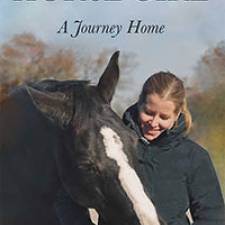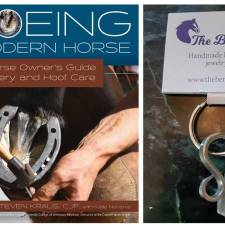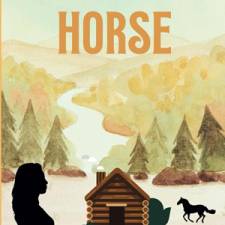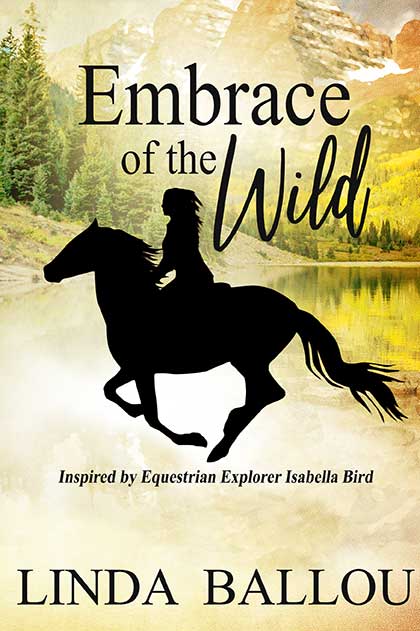
It was a lovely Indian summer day on the plains when I mounted Birdie. As usual, the gallant pony appeared as eager as I to get on the road. All traces of snow had melted in the warm sun. Fresh from the week off, she galloped across the plain as though she enjoyed it. The first day out was a great pleasure. I yearned for the solitude that allows my thoughts to settle. Riding alone encourages introspection. The rhythmic sound of Birdie’s hoof beats and the puffing of her warm breath sent me into a quiet meditation. Time with my dear desperado had changed me and filled me with unanswered questions. Could I now continue to live without the tender attentions of a loving man as I had done for the first forty years of my life? Would I become incurably bored without society and find a man to be another entrapment? Should I go on with my journey, or should I stop here in the heartbeat of the wild? It is in the interludes between being in company that we talk to ourselves. In the silence we listen to ourselves. In the quietude we find answers.
It is the custom of the West to take travelers in, as there are no hotels, and the weather can be fearsome. On the first night out, I saw a light burning in the window of a tidy log cabin with a grey stream of smoke rising from its chimney. A plump woman with rosy cheeks opened the door and bid me welcome. I slept with her children that night. When approaching settlers for lodging, sometimes I was only offered a mat on the floor and a biscuit for breakfast. After a week of riding ten hours a day staying at the homes of good people who opened their homes to me, I arrived at the home of Mr. Perry. Here my letter of introduction from Governor Hunt provided me comfort at his elegant farmhouse. Mr. Perry is a millionaire twice over from his cattle ranch. Here I enjoyed stewed venison and various other luxuries including hot water and a feather bed.
“You must let me take you to Pleasant Park, Miss Bird. It offers some of the finest scenery in the territory,” Mr. Perry’s daughter Lilah insisted.
“I would relish the opportunity to have you as a guide. Thank you.”
Miss Perry led the way to the narrow pass guarded by two bright red upright buttes. A remarkable display of monumental rocks standing in shocking colors of vermillion and orange framed the gorge carved by Bear Creek. Lilah said the cliffs lining the gorge reminded her of scenes in Egypt where she had a traveled with her family.
That night a storm arrived dropping a foot of snow. Birdie and I set out early while the sun was creeping over the horizon. I wanted to make it to the Arkansas Divide before nightfall. The world was silent, buried underneath a glittering carpet of white. The thin limbs of the birch stripped of leaves bent in the chill wind. There is purity mixed with solemnity in winter. No one had passed this way so there were no tracks to tell us if we were going in the right direction. No birds sang, no branches creaked. It was absolutely eerie. The only sound was the crunch of snow under Birdie’s hooves. We came to a bridge on a creek bound in ice. Birdie balked, which was so not like her. I urged her forward, but she reared and would not be swayed. Finally, she chose to enter the creek itself, but would not step foot on the bridge. Later, I learned the bridge was dangerous. I have come to love this pony with wild horse blood.
We ascended in silence and loneliness toward the Continental Divide at 7,975 feet. I stopped when we reached a cabin near a frozen lake. By nightfall, the temperature had dropped to below zero. A fierce wind whipped the pines. I was nearly paralyzed with the cold and my feet were frozen to the wooden stirrup. Two German ladies who lived in this desolate place boiled water and massaged my feet that were stinging with a thousand needles. My room was reached by a ladder. There were seventeen snowbound men lying on the floor of the main hall. No one is turned away in a storm.
The sun shone brightly the next day even though the air was still crackling. I am the lone tourist here and it suits me fine for I have had enough of company. One of the most wonderful things about traveling alone is that you can go at your own pace—the exact speed that makes you comfortable. You can stop serendipitously to marvel at what incites your imagination. After twelve miles, I entered a wild, romantic glen I thought must be Glen Eyrie. Encased in ghastly peaks, it offered wild and inspiring scenery. I drank in the healing beauty. Thoreau spoke of this in his essay on the benefits of solitude: “To live fully in the world our aspiration should be to absorb the continuity of nature not to attempt to dominate it.” My letter of introduction provided safe harbor at General Palmer’s baronial mansion. Its fine hall was lined with mounted buffalo, elk, and deer heads. This was to be my last taste of luxury on the tour.
Next, I entered bleak, treeless Colorado Springs scattered with plain wooden houses. I found lodging in a boarding house filled with guests. Through a half-open door, I saw two white feet dangling out from the covers in one of the bedrooms. In the morning I learned the feet belonged to a man who was consumptive. He had passed in the night and was to be buried in the morning. Had I known this I think I would have preferred sleeping in the stable with Birdie.
Armed with a warm coat and gloves, I set off on Birdie for Manitou hot springs, long known to the Indians to be healing. Thousands of consumptives come here in the summer to drink the waters and enjoy mountain excursions, but it is all quiet now. Snowclad peaks that rise to 14,500 feet overhang the valley slashed by a rushing torrent. It is grand and awful in its menacing beauty. I hope to get to Ute Pass by tomorrow, but all may be lost as Birdie has thrown a shoe. She amuses everyone we meet with her affections for me. She walks after me, lays her head on my shoulder teasing me for sugar. Luckily, we found a blacksmith and were able to reach Ute Pass by nightfall.
Ute Pass lies in the shadow of pine-sheathed mountains. A torrent blasted out the river corridor. A narrow track overlooking the ravine went ever higher for twenty miles. The stream cuts through hard rocks and tumbles over rose-red granite. It is a cold, dark, arduous climb. Above the towering cliffs, toothy snowclad peaks glitter in the morning sun. It was grand and glorious, but not lovable like Hawai’i. At that moment I yearned for the warm breezes and luxuriant foliage of the Islands.
I found shelter at a settler’s home and slept soundly after the arduous ride. There was not a cloud in the sky when I awoke next morning. This is an amazing climate with blazing sun by day and below-zero temperatures at night. The creeks crackle in the day, breaking through the ice formed at night. Waterfalls are frozen shafts of diamonds. The trees grew shorter, and the shrubs hugged the ground as we climbed toward the Divide.
I reached Bergen’s Park touted to rival Estes Park in beauty, but it made me miss my mountain home even more. The higher we climbed the more snow lay piled on the ground. The track was hard to see and often I had to rely on Birdie’s keen sense. By midday, we were tromping through snow up to her belly. She slipped and fell into a drift and struggled to free herself. I got off to help her recover and sank into the snow up to my shoulders! Damp and dis-spirited, we managed to slog on until we reached Colonel Kittridge’s cabin at Oil Creek where we spent the night with agreeable people.
I awoke to another cloudless morning feeling refreshed and ready to enjoy the demands of another day. I saw a man riding about a mile ahead of me and rode to overtake him. I requested his company as he knew the track and I had become lonely on my solitary ride. He was a most congenial, charming companion. He wore a big slouch hat under which curls hung to his waist. His beard was fair, his eyes blue, and his complexion ruddy. He dressed in a hunter’s buckskin suit and jangled a huge pair of Mexican spurs. His saddle was ornamented with silver amulets. He carried a rifle across his saddle, a pair of pistols holsters, two revolvers, knife in his belt, and a carbine slung behind him. He was full of stories about his hunting adventures. I rode with him across South Park to Breckenridge Pass. When we reached the Great Divide, he escorted me to a cabin where I could find lodging for the night.
“I’m sure you enjoyed the company of Comanche Bill. He is a real gentleman,” the kindly woman who lived in the cabin informed me. It turned out my courteous companion was a notorious desperado and the greatest Indian exterminator on the frontier. “His family fell in a massacre at Spirit Lake by the hands of the Indians who carried away his eleven-year-old sister. His life has since been devoted to killing Indians wherever he finds them,” she said.
Now, I understood why Mr. Nugent and this otherwise charming murderer would be at odds. Jim was a defender of the Indians and Comanche Bill was determined to exterminate them. Still, this did not excuse outrageous behavior. The talk between my hostess and two Irish ladies was about a lynching that took place the day before I arrived. They pointed to a tree on a distant knoll where the wretch had met his end. He had been tried, convicted, and strung up all within an hour’s time. Their tales were filled with grisly, cruel acts. This country is untamed. Busted miners, hunters, and criminals hiding from the law find refuge in the high country.
The Great Divide, the goal of my journey, was disappointing. Lonely, mournful, treeless, and windswept, its chief center was a rough mining town ironically dubbed Fairplay. The region has been “rushed” and mining camps sprung up here are so lawless and brutal that vigilantes take matters into their own hands. I slept with the derringer Jim had given me beneath my pillow that night.
I struck out the next morning for the Denver Stage Road that would take me back to Denver. I hoped that would end my rough passage, but it turned out to be the rudest, darkest route yet. It took me through a ravine walled in on both sides by pine clad mountains. For fifty miles along this abyss, there are only five houses. My energies were flagging. I left a silent, dreary sea of white only to descend into this hellish ravine. Snow in the shadow of the mountains didn’t melt, rather it piled up into huge drifts. Birdie kept falling on her nose because the snow balled up in her feet. I didn’t have a pick strong enough to free her from slipping and sliding downhill. I had to dismount and walk with her through deep drifts.
It was totally black out when at last I saw the blaze of a hunter’s fire. They directed me to a cabin nearby. A man of good nature who was obviously intoxicated opened the door to the smoke-filled den. There were other snowbound travelers lying about that included an English dandy, a couple of miners, and a hunter who appeared to be in a fever. They asked me if I was the English lady written about in the Denver News. For once I was glad my reputation preceded me. I opted to sleep in a shed with my derringer under my pillow than inside the lair of these rough men.
About the Author
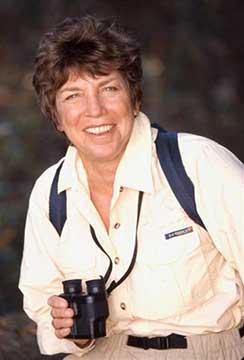
Nothing pleases adventure-travel writer, Linda Ballou, more than seeing gorgeous country from the back of a good horse. Her articles have appeared in Equus, Horse Illustrated, California Riding Magazine and numerous travel publications Her New-Adult novel The Cowgirl Jumped Over the Moon that takes you from the Grand Prix circuit to the high Sierras was the Founder’s Choice at the Equus Film Fest.
She just released Embrace of the Wild inspired by the life of equestrian explorer Isabella Bird. The “Year of the Virus” was a golden opportunity to write the story of this incredible woman who broke through social and physical barriers to become the best-loved travel writer of her time. (1831-1904) In research for her first novel Wai-nani: A Voice from Old Hawai’i, Linda used Miss Bird’s book Six Months in the Sandwich Islands for vivid details of the Hawaiian Islands in 1873. On a trip in Colorado Linda discovered Isabella’s book A Lady’s Life in the Rockies where she rode 800-miles solo on her mare she named Birdie. Linda identified strongly with this woman who became the best-loved travel writer of her day and wanted to share her story.
You will find Linda’s travel article and books at www.LindaBallouAuthor.com.
Find this book and more in our section devoted to Books.








